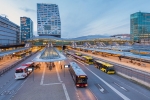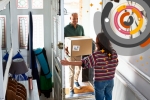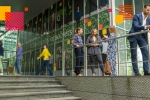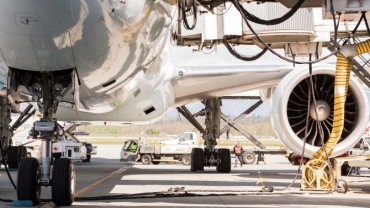
Why is sustainable aviation so important? And how do we at PwC Netherlands take responsibility by reducing, compensating and innovating, and how do we contribute to our ambition being Net Zero by 2030? Welcome on board our sustainable aviation journey.
With the Environmental Footprint Insights app, we want to create transparency on the impact of our choices and also realize sustainable behavioural change.
PwC NL switches to 100% Sustainable Aviation Fuel (SAF)
We like to contribute to the future of aviation
It is important to us, as an international company, to think about the future of aviation and to contribute to making it more sustainable. As a chairman of the Anders Vliegen working group in the Anders Reizen coalition. A network of large companies working together with the objective of making their business mobility more sustainable. We encourage other organisations to follow us in our efforts to reduce emissions from flying.
We stimulate innovation in aviation by, for example, making a financial donation to the Netherlands Aerospace Centre (NLR) for the purchase of an electric aircraft. This will allow further research into sustainable ways of flying. Our donation to the Sustainable Flying Foundation and the Dutch Airports Association is intended to stimulate the development of charging stations for aircraft.
We're driving the use of sustainable jet fuel worldwide
PwC is part of the initiative to accelerate the supply and use of sustainable jet fuel. Together with other companies, airlines and airports, united in the World Economic Forum's Clean Skies for Tomorrow Coalition, PwC aims to ensure that at least 10% of the world's jet fuel supply is sustainable by 2030. To this end, it will share its knowledge and expertise in this broad coalition to make the aviation sector more sustainable. In doing so, PwC is contributing to the development of a system of SAF certificates in aviation and how to measure and report the CO2 impact.
"Sustainable flying is part of achieving our net zero ambition for 2030" says Renate de Lange, member of the executive board at PwC and responsible for corporate sustainability. "In recent years we have seen a strong reduction in our mobility, and COVID-19 has further accelerated this. However, in order to do our work properly, we sometimes have to travel and fly. That's why PwC is constantly looking for ways to achieve its Net Zero ambition. For example, by introducing an internal CO2 pricing system, by offsetting CO2 and now by committing to switch entirely to SAF for air travel by 2022.
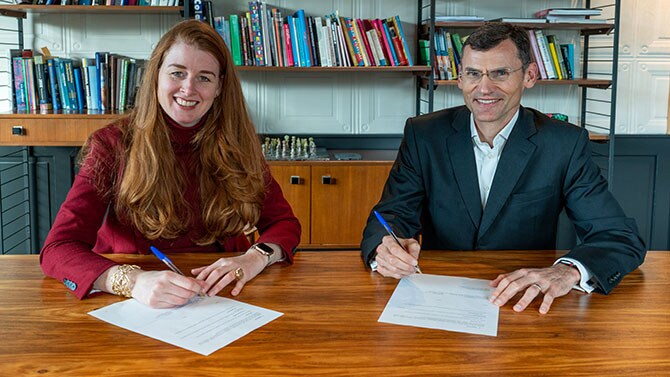
How can aviation become more sustainable?
Aviation accounts for 3% of global CO2 emissions annually. Listen to Wineke Haagsma, Corporate Sustainability Director for PwC Netherlands, explain how to overcome the barrier to widespread adoption of sustainable aviation fuel and help reduce aviation’s impact as the world aims to achieve net-zero targets.
PwC NL staff fly entirely with Sustainable Aviation Fuels (SAF)
PwC Netherlands is the first large organisation to have its staff fly with Sustainable Aviation Fuels (SAF). We have a signed contract for the purchase of biokerosene. The CO2 emissions of this sustainable paraffin have the potential of up to 85% reduction. With this commitment, we are reducing our own CO2 emissions from business air travel and contributing to the future of sustainable paraffin. Wineke Haagsma, Corporate Sustainability Director at PwC Netherlands explains how the impact of aviation can be reduced to achieve the net-zero targets.
How does it work?
It does not mean that all flights with PwC colleagues on board take off with sustainable fuel. It is comparable to a contract for green electricity. You purchase enough renewable energy for your consumption and thus contribute to the future of renewable energy.
PwC pays the surcharge of SAF over fossil paraffin to a SAF supplier. For every litre of paraffin used by PwC on its flights, PwC pays for one litre of SAF. The supplier delivers the quantity of SAF to an airport and receives a certificate. In practice, all aircraft that fill up there, therefore fly a little bit more sustainably. Only the CO2 reduction achieved in this way may be attributed to PwC's emissions reporting.
Currently, PwC only purchases biokerosene to meet its 100% SAF commitment. Only residual and waste streams such as used cooking oil are used as raw materials for biokerosene. There are not enough of these flows available to ultimately meet the global demand. We are therefore closely following the development of other SAFs, such as sustainable synthetic paraffin. With the biokerosene purchase, we expect to achieve a CO2 reduction of up to 85% compared to the use of fossil fuel. As PwC also reports on the non-CO2 effects of flying, the effective reduction will be lower, expected to be 40-45%.
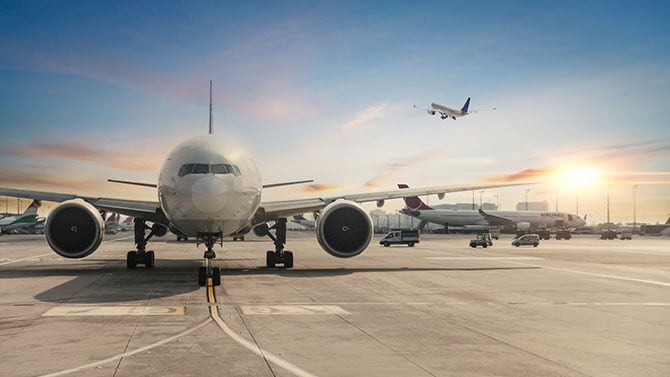
Customer appointments remain important, but the COVID crisis has brought us a new perspective on travel. We have become more familiar with online meetings.
Stimulating change and influence decision making
Post-COVID many organisations are discovering a new balance on how to travel less and more sustainably. As a global organisation, client meetings both in person and virtually, will remain an essential part of our work. Thus, PwC implemented Sustainable Network Travel Principles, and many other measures. One of the measures PwC Netherlands announced in 2022, is to pay the surcharge of Sustainable Aviation Fuels over fossil paraffin to a SAF supplier for all kilometres our staff travels by air.
As of July 2023, we took the next step by charging the SAF costs to internal departments and our clients. We believe this next step will further stimulate change and influence the decision making on air travel, which will have a positive impact on the reduction or our overall flight emissions. This approach serves multiple purposes. In essence, it is a shared responsibility to reduce our carbon emissions from travel. And it creates an incentive for all stakeholders to actively reduce international travel.

Sustainable choices are about behaviour
With our own practical Environmental Footprint Insights (EFI) app, we keep track of our employees' commuting and business travel emissions. This gives us a precise idea of how much sustainable fuel we need to buy. In addition, by using the app to provide insight into the impact of our choices, we hope to achieve a sustainable behavioural change. If an employee or customer is aware of the CO2 impact, we noticed that they are less inclined to travel. And if we do fly, we do so on a 100% SAF basis.
PwC net zero in 2030
Within PwC Netherlands, our air travel has the greatest impact on our CO2 emissions. In the last financial year (2020/2021), CO2 emissions from flying fell by more than 95 per cent compared to pre-COVID levels, largely also due to the pandemic. While customer contact remains an essential part of our work as a global organisation, the COVID crisis is casting a new perspective on travel. We have become more familiar with online meetings, but customer appointments remain important.
It is about finding a new balance. In doing so, we are continuing on the path we took before the COVID crisis. The starting point remains to be critical when getting on a plane. And if we do fly, we choose direct flights wherever possible. Most emissions are caused by taking off and landing. For relatively short journeys to, for example, Frankfurt, Paris and all stops in between, we take the train.


